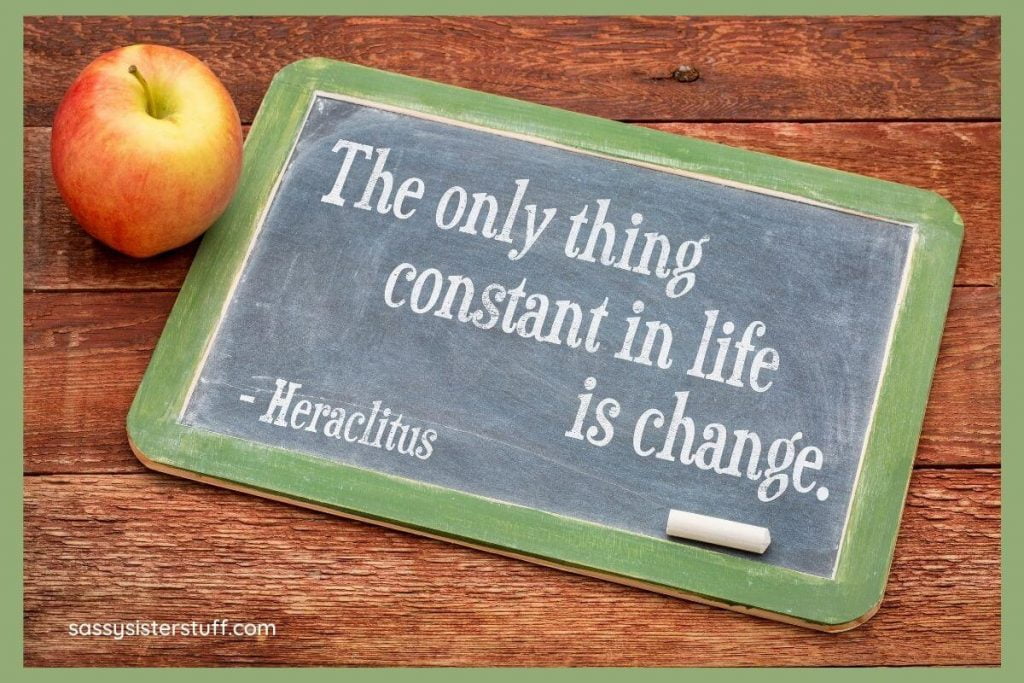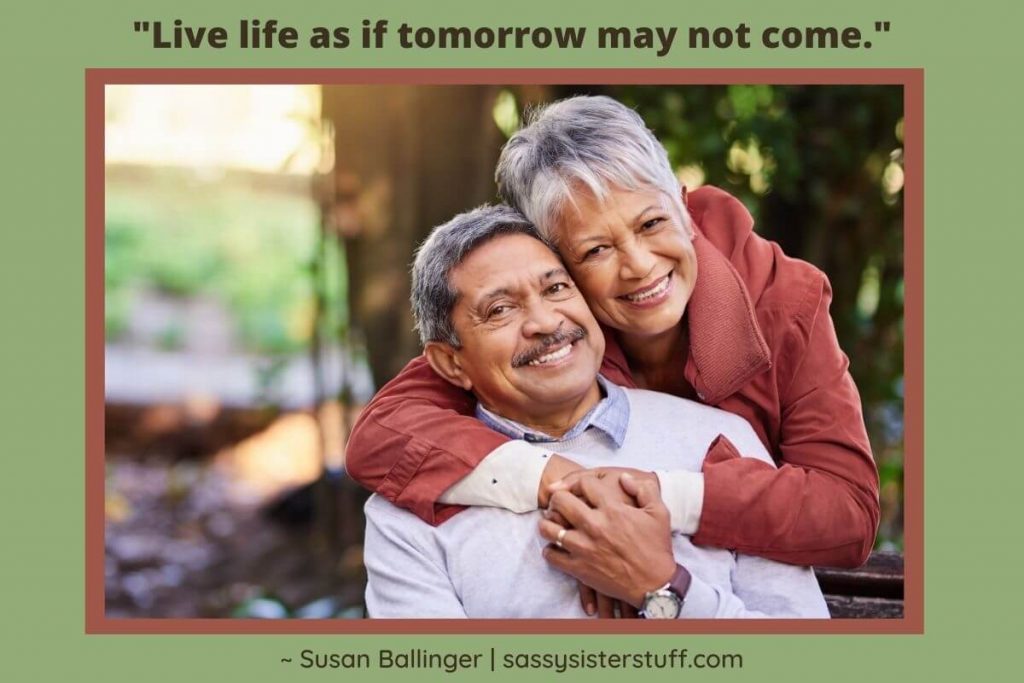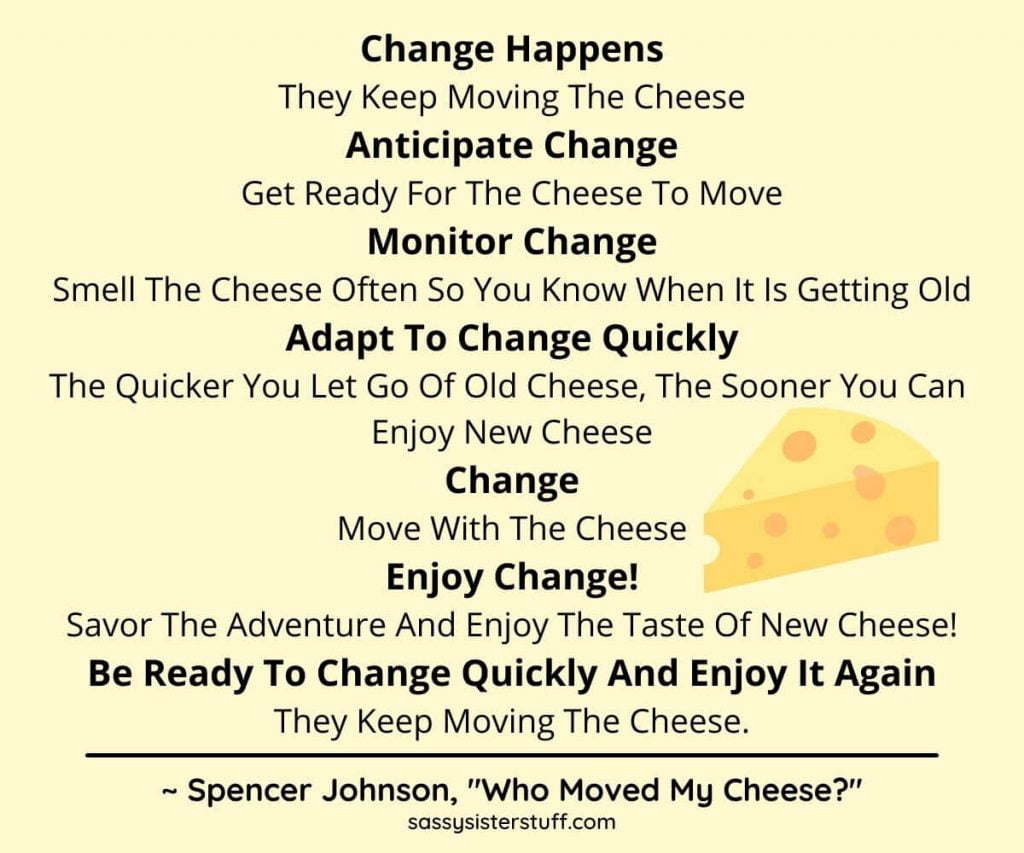How to Survive Major Transitions in Life
I’ve gone through some of the toughest years of my life as an middle-aged adult — but admittedly, my problems are small compared to some, and I try to keep things in perspective. I’ve learned to develop coping skills and self-care skills to help me survive the many transitions, so I decided to share how to survive major transitions in life based on my real-life experiences.
We all expect important life transitions such as empty nest syndrome, bringing home a new baby, adopting a new pet, moving to a new home, etc. Those are pretty common transitions that have typical challenges, but we learn to grow and adjust, right?
But there are also transitions in life that may not be what you anticipated for your life. So you need to understand what you can do to not only survive, but eventually thrive while coping with life changes and transitions.

Remember, the only thing constant in life is change. And in order to maintain a balanced life, you will likely need to develop some healthy strategies and coping skills to deal with major life changes — both expected and unexpected.
Disclaimer: I am not a healthcare professional and you should not consider any information in this article a professional consultation about your personal situation. My writing is based solely on personal experience and research. You should seek professional support if you are struggling.
Related Article: 21 Practical Ways to Protect Your Energy in Difficult Times
Dealing with Life’s Biggest Transitions
Let’s begin with types of transitions in life that may cause stress, and/or the need to redefine your personal development and life plans. There are too many potential major changes to include in one article, but we’ll list a few to get us started.
Then we’ll look at a list of some ways in which we generally respond to a major life transition — either expected or unexpected. Even during the best of circumstances, we might have unexpected reactions and emotions to significant changes and transitions in life.
And finally, we’ll look at coping skills and strategies — such as simple acts of self-care and effective ways to maintain a healthy mindset — to help us survive unexpected transitions in life.

Examples of Challenging Life Transitions
It’s our natural tendency to want to remain where we are comfortable and feel in-control of life. But that is not always possible since change is constantly occurring around us. So transitions, whether by choice or not, may be challenging.
These are just a few transitions in life that may cause a significant amount of stress and negative emotions:
- Death of a loved one
- Change in career or a new job
- Loss of a job
- Family members who suffer substance use disorders
- Mental health problems or depression
- Teen years
- Marriage
- Empty nesting
- Getting married
- Having a Baby
- Death of a best friend
- Mid-life crisis
- Retirement
- Moving to a new city
- Buying a new home
- Adult children return home
- Financial problems
- Caring for a grandchild
- Caring for an elderly parent
- Going back to school
- Dealing with a serious health issue
- Unexpected injuries
- Serious car accident
- Menopause
- Natural disaster

Potential Emotional Responses to Big Life Transitions
Human nature informs us that change is often difficult. Have you read the Spencer Johnson, “Who Moved My Cheese?,” series of books? More on those later, but there are books for adults, teens, and children who are struggling with transitions in life.
These are some responses you may experience during transitions in life:
- Depression or sadness
- Adjustment disorder
- Anxiety disorder
- Crying spells
- Feeling scared or vulnerable
- Increase or decrease in appetite
- Sleep problems
- Eating disorders
- Trouble concentrating
- Time management problems
- Mental illness
- Mood swings
- Headaches
- Muscle tension
- Alcohol or drug abuse
- Stomach or digestive problems
- Lack of motivation or interest
- Feelings of guilt or failure
- Withdrawal from others or feeling lonely
- Relationship conflicts
- Decreased energy

How to Survive Transitions in Life
I think you can see the difference between an unexpected transition in life and something that you can usually anticipate in life, right? But did you know you may in fact have similar emotional responses? I did, even when I knew a change was happening and a new beginning was ahead.
Let’s look at some of the positive ways you can survive these transitions in life, whether expected or unexpected. You will need to learn how to cope with life changing events and times of transition. .
- Don’t deny the feelings you are having. If you do this, you will only make the problem bigger. You may not like the change, and you may not even like the response you are having to it, but you have to feel ALL THE FEELINGS. Acknowledge them, talk about them, reflect about them, journal about them, and label them… I suggest you look at a Feelings Wheel like the one on the Calm App or the Silk and Sonder Self Care Toolkit. There are dozens of emotions listed on a feelings wheel and you can pick the best label for the feeling(s) you are having about the changes. It helps you clearly understand the emotion so you can properly deal with it.
- Understand that your feelings are perfectly normal and it’s okay to not be okay. You do not need to be perfect all the time, and you should not beat yourself up for having strong emotions about a change that is occurring around you. It’s okay to not be okay — as long as you are moving in a direction where things are okay again. Be easy on yourself. Major transitions in life are not easy. You may experience depression and your daily life may look different, but you’re going to figure this out.
- Practice a variety of self care habits on a regular basis. Take a ride — get away from it all. Take a walk along the beach or a trail in the forest. Listen to your favorite music. Meditate. Get plenty of exercise and sleep. Drink plenty of water and eat properly. It is important to take care of yourself when you are dealing with anxiety or stress. Your body is already under assault — it needs you to take care of it now more than ever!

- Spend time with friends and people who understand and support you. Positive social interaction is an important part of a balanced life and a healthy mind. But it is especially important when you are feeling emotionally challenged due to changes and transitions in life. Schedule lunches together, get outside in nature with your friends, and laugh. Make new friends who have common interests. Hang out with people who provide you with emotional support. Make sure your social support system is solid.
- Consider professional help. You may want to start seeing a professional counselor or therapy to help you work through your emotions. There are a variety of kinds of mental health services available today to help people with stressful experiences and times of change. Cognitive behavioral therapy is a very popular form of treatment for life stage transitions. A professional can help you identify new ways of coping and making positive changes in your life. They can also help you strengthen your normal coping mechanisms to use during your time of transition.
- Reflect, reflect, reflect. Reflection is one of the greatest habits you can develop for self care, personal development, and wellness. But it is especially important during a difficult transition. Take serious time to reflect on what is happening around you; it will provide you with clarity, purpose, and perspective. You’ll be about to see why this is happening and how you can walk away from it a stronger, better person with a new reality. If you can’t see why it is happening, as you reflect, you need to trust that there is a reason and it will reveal itself in time. Identify your core values, live in the present moment, and don’t let outside influences negatively impact you. Keep everything in perspective. You’re in a new phase of life and it could be a good starting point for great things.
- Use affirmations and inspirational quotes to gain strength during this life transition. Words are powerful, and empowering. Your brain absorbs what you say to it — say positive words and your mindset will be positive. Say negative words and your mindset will be negative. Affirmations and inspirational quotes can provide hope, perspective, and belief that the situation will get better. You will find plenty of helpful words of wisdom on the pages of Sassy Sister Stuff, but you may want to take a look at these articles in particular:
- 50 Powerful Affirmations of Self-Love
- Bedtime Affirmations for Good Sleep
- 29 Find Your Path Quotes: Amazing Inspiration for Your Journey Through Life
- 55 Awesome Self-Growth Quotes to Inspire Your Personal Growth
- Reframe the situation and ask, “What am I learning from this situation?” We learn lessons from everything we go through in life. You may have a hard time thinking about that while you’re going through a difficult life transition. But always TRUST that you are learning SOMETHING and it is helping you become a stronger, better YOU in some way. Instead of waiting, and looking back on the situation to think about what you learned — ask yourself the question while you’re experiencing it. Reframe the situation from my life is a mess to what am I learning from this? Take notes as you go along and share what you are learning. It will help you keep the changes in perspective.
- Get the book(s) “Who Moved My Cheese? An A-Mazing Way to Deal with Change in Your Work and in Your Life” by Spencer Johnson and read it! The books are easy to read. I believe they have been described as 4-minute self-help books related to dealing with change. They’ve been on the best seller lists for since the first one came out in 1998. Choose the book for children, teens, or adults. The lessons are all the same. These are some quotes that come from the book:
“He was taking control, rather than simply letting things happen to him.“
~ Spencer Johnson
“He knew that when you change what you believe, you change what you do.“
~ Spencer Johnson
“Noticing small changes early helps you adapt to the bigger changes that are to come.“
~ Spencer Johnson
“The fear you let build up in your mind is worse than the situation that actually exists.”
~ Spencer Johnson
“When you change what you believe, you change what you do…”
~ Spencer Johnson

Final Thoughts About Transitions in Life
As I was writing this article, I genuinely reflected on the past 8-10 years of my life. It gave me an awesome perspective about the changes I’ve made during these difficult years. I am a different person in so many ways because of the challenges. But I also realize that I am lucky — because I’ve always had a wonderful support system around me.
But with that being said, I can assure you, I had to utilize the strategies and coping skills above in order to survive all those transitions in life (even with a great support system around me). And to this day, I still use these strategies and skills!
Always remember when you are going through a challenging time in life, it may just lead to something more positive. You know — the concept of when one door closes, another door opens.
Transitions in life sometimes turn your world upside-down for a time, but they can also cause you to re-evaluate your priorities. As you take time to reflect, you may have a shift in focus to what’s really important in your world; or you may find a greater opportunity ahead of you and you’re more prepared for it now.

Pin to Pinterest for Later
You may also learn to become more flexible, tolerant, and resilient in the face of change; or become more empathetic toward others.
I became stronger and more knowledgeable about issues facing middle-aged women in today’s society. And I’m using that knowledge to write, and create the wonderful Sassy Sister Stuff community.
Whatever you learn from each transition in life, you can be confident that you are tapping into your personal strengths, building your self-confidence, and moving toward becoming the person you are supposed to be in life! It’s all part of your personal growth and development in life! Be thankful, my friends!
Love to all! ~ Susan
How to Survive Transitions in Life | Have You Experienced Life Changing Transitions? What Have You Learned?
Please share your thoughts in the comment section below. You may be able to help others who are experiencing difficult times.







